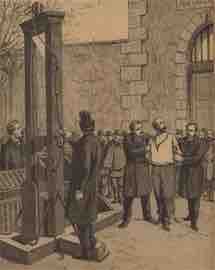What Is Capital Punishment?
Capital punishment is a legal process whereby a person is put to death by the state as a punishment for a crime. Crimes that can result in a death penalty are known as "capital crimes" or "capital offenses. " Capital punishment has in the past been practiced by most societies. Currently, only 58 nations actively practice it, and 97 countries have abolished it. Although many nations have abolished capital punishment, over 60% of the world's population live in countries where executions take place–the People's Republic of China, India, the United States, and Indonesia–the four most-populous countries in the world, that continue to apply the death penalty.
Execution of criminals and political opponents has been used by nearly all societies–both to punish crime and to suppress political dissent. In most places that practice capital punishment, it is reserved for murder, espionage, treason, or as part of military justice. In some countries sexual crimes, such as rape, adultery, incest, and sodomy, carry the death penalty, as do religious crimes, such as apostasy in Islamic nations. In many countries that use the death penalty, drug trafficking is also a capital offense. In China, human trafficking and serious cases of corruption are punished by the death penalty. In militaries around the world courts, martial have imposed death sentences for offenses, such as cowardice, desertion, insubordination, and mutiny.
Arguments For and Against
Supporters of the death penalty argue that the death penalty is morally justified when applied in murder, especially with aggravating elements, such as multiple homicide, child murder, torture murder, and mass killing including terrorism or genocide. Some even argue that not applying the death penalty in latter cases are patently unjust. Supporters of the death penalty, especially those who do not believe in the deterrent effect of the death penalty, say the threat of the death penalty could be used to urge capital defendants to plead guilty, testify against accomplices, or disclose the location of the victim's body.
Capital punishment is often opposed on the grounds that innocent people will inevitably be executed. Between 1973 and 2005, 123 people in 25 states were released from death row when new evidence of their innocence emerged. Abolitionists believe capital punishment is the worst violation of human rights, because the right to life is the most important, and judicial execution violates it without necessity and inflicts to the condemned to a psychological torture. In addition, opponents of the death penalty use the argument that executing a criminal costs more than life imprisonment does. Many states have found it cheaper to sentence criminals to life in prison than to go through the time-consuming and bureaucratic process of executing a convicted criminal.

Capital Punishment
Anarchist Auguste Vaillant guillotined in France in 1894.